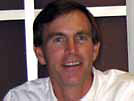Input: more leafy vegetation. Output: less rainfall?
to Lee’s Ferry, the all-important dividing line in the Colorado River Basin between the Upper and Lower Basins. Lee’s Ferry is named for my great great grandfather, John D. Lee, the founder of the ferry.
What are you working on right now?
I’m working on establishing a regional science consortium with the key decision makers in the region to address large-scale Colorado River Basin water issues. Nearly 40 major players showed up to a meeting to begin talking about how we can establish this entity to help advance the science in the region of the United States most threatened by climate change, including assistant Secretaries, the head of the U.S. Geological Survey, the Commissioner of Reclamation, and key water managers from Los Angeles, Las Vegas, Arizona, and Colorado.
What’s a key take home message from your research?
Water will be the delivery mechanism for many of the most important impacts of climate change. We’ll see all kinds of changes in the amounts, timing, and distribution of water as the globe heats during the 21st century. Many of these changes will challenge humans, animals, and plants as we try to adapt to a very different world brought on by climate change. ![]()
Brad Udall, Western Water Assessment

![]() Coffee Filters: Coffee and dark chocolate are two things that “can make a huge mental difference in almost any environment,” says Udall.
Coffee Filters: Coffee and dark chocolate are two things that “can make a huge mental difference in almost any environment,” says Udall.
![]() Tupperware: Standard lunch includes bring-your-own pasta and fruit.
Tupperware: Standard lunch includes bring-your-own pasta and fruit.
![]() Side Desk: Collection space for works in progress
Side Desk: Collection space for works in progress
![]() The Ties That Bind: Udall takes pride in binding reports himself using his comb-binding machine.
The Ties That Bind: Udall takes pride in binding reports himself using his comb-binding machine.
![]() Mapping Water: “There’s not enough wall space for the posters I’d like to hang,” Udall says.
Mapping Water: “There’s not enough wall space for the posters I’d like to hang,” Udall says.
![]() The Futon: The place of power naps, good ideas, and papers.
The Futon: The place of power naps, good ideas, and papers.
![]() Limes: Udall adds zest to plain water with a little citrus.
Limes: Udall adds zest to plain water with a little citrus.
![]() Behavioral Theory of the Firm: A key reference guide for Udall’s work on the nearly 40-person regional science consortium for the Colorado River Basin.
Behavioral Theory of the Firm: A key reference guide for Udall’s work on the nearly 40-person regional science consortium for the Colorado River Basin.
When did you first become a fan of science?
I’ve always enjoyed science. My biggest laboratory was when I was a Grand Canyon river guide during and after college. Nowhere on the planet is more inspiring for asking huge questions about the history of the Earth than the depths of the Grand Canyon’s inner gorge with its nearly 2 billion-year-old schist and gneiss.
What are your favorite subjects?
I’m a glutton for all knowledge. Amazon.com lightens my wallet on a regular basis. All forms of science, public policy, politics, economics, and medicine grab my interest.
Who inspires you?
My wife. She is an unbelievably dedicated teacher at Fairview High School, who works long hours to benefit the community, the state, the nation—all without much recognition.
Where has science taken you over the years?
In recent years, all over the Southwest, including all the major metropolitan areas that use Colorado River water—Los Angeles, Las Vegas, Tucson, Phoenix, Denver, Albuquerque. It has also taken me


